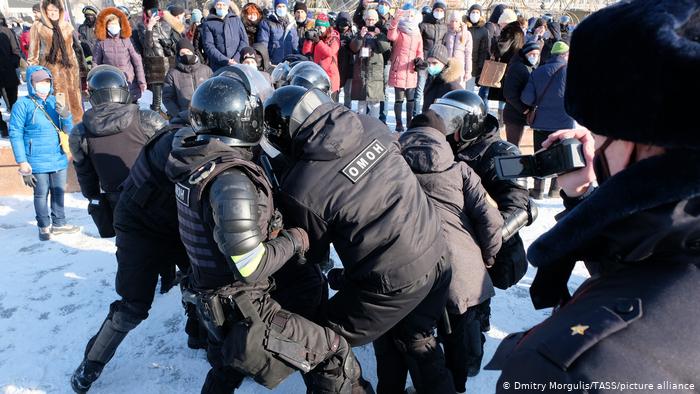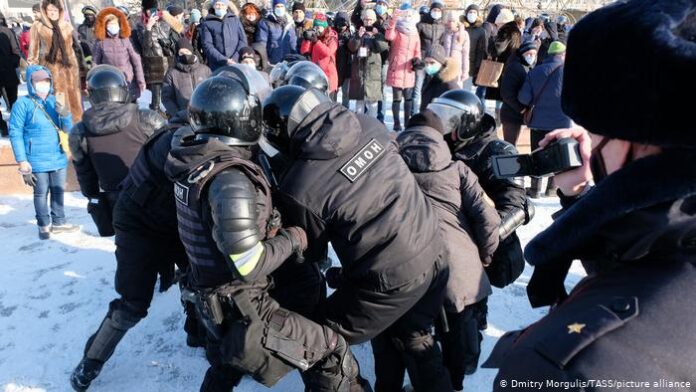
Civil rights activists say 125 people have been detained in Russia since a day of protests showing support for imprisoned dissident Alexei Navalny got underway on Saturday.
OVD-Info, a volunteer platform that counts arrests at mass demonstrations in Russia, reported detentions in a number of cities in the country’s far east, where protests began hours ahead of the capital Moscow due to the time difference.
In the city of Khabarovsk, where protests also focused on the arrest of the city’s popular former governor, Sergei Furgal, activists shared video footage of police officers beating demonstrators and bundling them into a van.
However, videos shared on social media also showed the police refraining from intervening in many locations.
Protesters were also seen being led to police vans on Moscow’s central Pushkin Square even before the demonstration began there.
Dozhd, an independent news portal critical of the Kremlin, showed footage of the arrests, while a dpa reporter at the scene spoke of a major police presence.
In the Siberian city of Tomsk, where Navalny was poisoned with the Novichok nerve agent in August, his supporters are expected to stage the largest unauthorised protest in decades.
Navalny has blamed the chemical attack on President Vladimir Putin and the FSB intelligence service – charges which the Kremlin denies.
According to Navalny’s backers, thousands of demonstrators turned out in the cities of Khabarovsk, Irkutsk and Novosibirsk, braving freezing-cold temperatures.
Crowds shouted slogans like “We have the power” and “Putin is a liar”.
Earlier this week, Navalny’s team released a video titled “A Palace for Putin,” claiming to show that the long-standing leader has built a “tsarist empire” on the Black Sea funded by bribes.
The Kremlin calls the accusations a “lie”.
Navalny’s supporters have announced protests in more than 90 cities throughout Russia on Saturday.
The rallies, announced on social media, have not been given permits, however, and Kremlin spokesperson Dmitry Peskov has warned members of the public not to participate in unsanctioned protests.
Demonstrations have been banned for months due to regulations to control the pandemic.
The authorities have also clamped down on Navalny’s associates and supporters, detaining several of his aides, including his press secretary Kira Yarmysh.
Navalny, who returned from Germany last weekend, where he had been recovering from the assassination attempt, was sentenced to 30 days of pre-trial detention at a snap trial on Monday.
The Russian judiciary says Navalny was sentenced for violating parole from an earlier sentence by travelling to Germany for his recovery.
Navalny and his team criticised the process as a politically motivated attempt to silence him.
The EU imposed sanctions after the poisoning and several countries, including Germany, have called on the Russian government to release Navalny immediately.
Russia has warned foreign powers against interfering in the weekend protests.
The Russian Foreign Ministry criticised the U.S embassy in Moscow for listing the times and meeting places of several of the Saturday demonstrations on its website.
The embassy warned U.S citizens to “avoid these demonstrations and any demonstration-related activities,” but the ministry said its real intention was to spread information about the protests in the country. (dpa)

